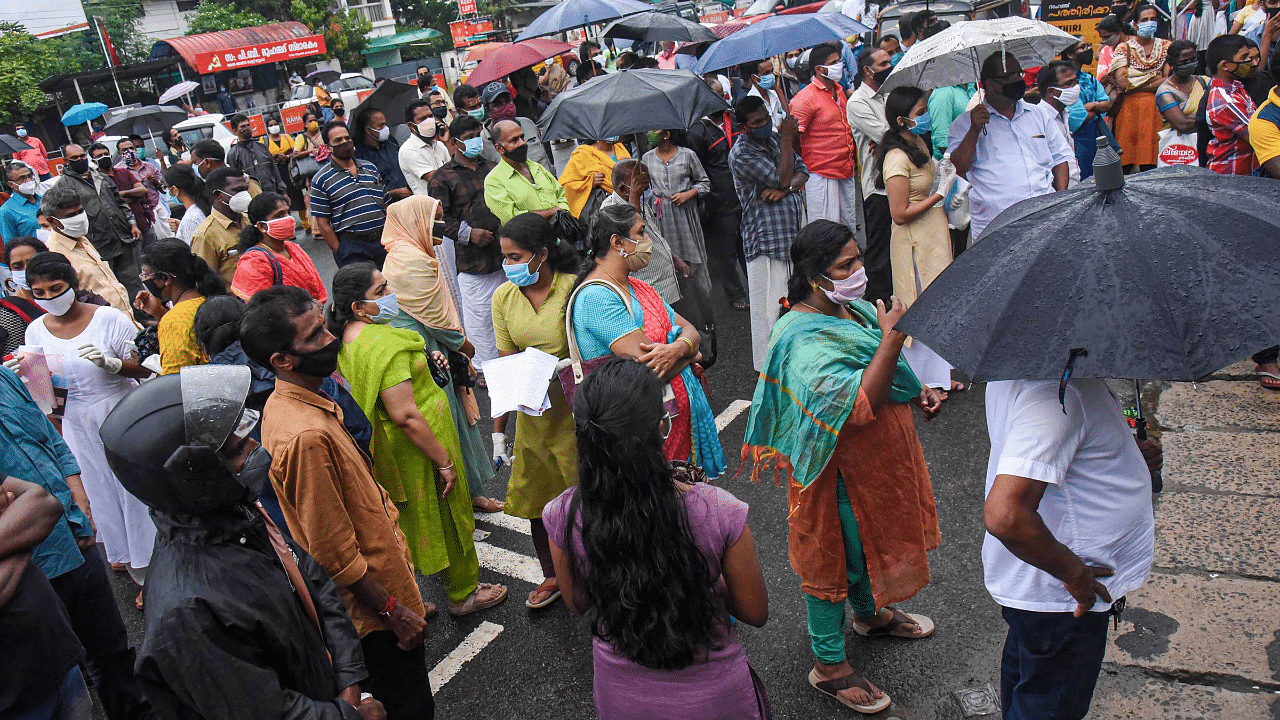
Kerala, despite being low in terms of the total population, is now emerging as one of the top states in terms of Covid-19 active cases that have almost touched the 1 lakh-mark.
Though the state received much appreciation for containing the virus during the initial months as it flattened the curve by May, the scenario has now turned topsy-turvy.
Relaxations in gatherings, poor enforcement of social distancing, low number of tests, and ineffective utilisation of the private health sector are cited by experts as key reasons for this.
Considering the increasing test positivity rate of around 17 per cent and comparatively lesser number of daily tests, which is below 70,000, the actual number of Covid-19 infected patients in the state could be much higher. This indicates that Kerala is yet to reach its peak. Kerala Chief Minister Pinarayi Vijayan also said on Saturday that the present trends indicated that the Covid-19 graph would continue its surge in the coming weeks also.
Is low number of testing a reason?
Experts differ in the general criticism that the low number of tests was one reason for Kerala's Covid-19 surge. Doctors in the government sector point out that the number of testing in Kerala was kept lower during the initial months of the outbreak to make the health sector prepared to handle patients and hence the mortality rate in the state is still at the lowest rate of 0.35 per cent.
The number of testing facilities was also low initially. But Indian Medical Association Kerala chapter secretary Dr. P Gopikumar said that by conducting the maximum number of tests the infected could be isolated at the earliest and thereby the spread could have been minimised.
A doctor in the government sector, who preferred not to be quoted, said that the testing strategy needs to change. There is no need to conduct an exit test for asymptomatic Covid-19 patients as the chances of the spread of infection from a Covid-19 patient would be almost nil a week after the infection. Instead, the number of tests among the high-risk groups should be enhanced.
Opening up of markets for Onam, relaxations, and strikes
Restrictions were literally thrown to the winds in Kerala during the Onam season last month. Most major shops and commercial streets were live. Moreover, an increasing number of participants for events like marriages, relaxations in short-term travel to Kerala from other states for official purposes, resuming of public transport, and surge in strikes were also contributing factors.
Known public health expert and consultant at Sree Chitra Tirunal Institute for Medical Sciences and Technology, Dr. V Ramankutty said that the government should have imposed the curbs to the maximum extent possible to avert the surge. People should be properly educated to be safe by keeping off from gatherings.
Poor enforcement of social distancing norms
Though thousands of persons were booked for flouting social distancing norms in Kerala daily, it seems to be just the tip of the iceberg as a violation of social distancing was visible in every nook and cranny - let it be transport buses or shops. A large section of police personnel were also said to be quite reluctant towards enforcements as the number of police personnel getting Covid-19 infected was also increasing.
Ineffective utilisation of private hospitals
Right from the initial weeks of the Covid-19 surge and considering the trends in many parts of the world, government doctors in Kerala have urged that the private hospitals should be also made ready to joining the Covid care.
Dr. Ramankutty pointed out that private hospitals that dominated the state health sector with at least 60 to 70 per cent of the total hospital beds in Kerala should have been utilised more effectively. There were allegations that private hoto make spitals were trying money from non-Covid patients.
Kerala Government Medical Officers' Association state president Joseph Chacko said that response of private hospital doctors towards state government initiatives like forming a team of health volunteers was also very bleak.
Meanwhile, Dr. Gopikumar of IMA said that lack of infrastructure like separate wings for Covid-19 patients was the reason why most private hospitals initially shown reluctance to join the Covid care. But now many private hospitals are providing Covid care.